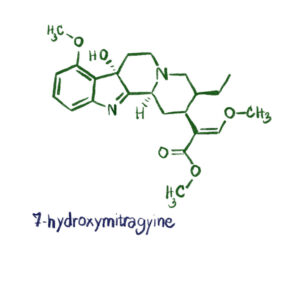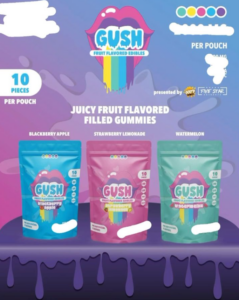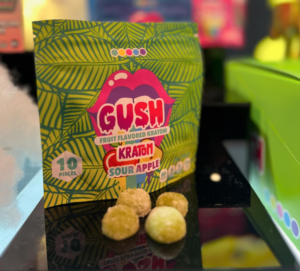
Your Really Goo’d Guide to 7-HYDROXY
7-HYDROXY, also known as 7-Hydroxymitragynine (7-OH), is a naturally occurring alkaloid found in the leaves of the Mitragyna speciosa tree (commonly known
Cannabis trends come and go, but THCA has become a permanent fixture of the hemp market, dazzling and delighting consumers thanks to its unique relationship to delta 9 THC. By exploiting a legal loophole, brands on the hemp scene have been able to deliver loads of dreamy products that give you the same chemical composition as marijuana, all while being totally protected under federal law.
THCA is probably the one cannabinoid that users are buying up the most of right now. But at the same time, a lot of us don’t really know much about it other than the fact that THCA products like vapes, flower, and concentrates feel just like marijuana. Well, we’re here to give you a complete guide to the cannabinoid, so that you have a much clearer understanding of what you’re actually taking.
THCA is the short and sweet name for tetrahydrocannabinolic acid, which’s raw Delta-9-tetrahydrocannabinol (Delta 9 THC), was first isolated and identified in 1964 by Israeli chemist Raphael Mechoulam and Yechiel Gaoni. They were the first to successfully isolate and synthesize both THC (tetrahydrocannabinol) and THCA from cannabis. This discovery laid the foundation for further research into the psychoactive components of cannabis.
Now, “raw” THC may sound weird, but it’s actually a totally natural component of cannabis flower. See, when you’re handling buds, you’re looking at over 100 cannabinoids in their raw forms – such as CBDA instead of CBD, CBNA instead of CBN, and THCA instead of THC. Only after you heat the flower to the right temperature, like through the act of smoking or baking it, do you end up with their post-decarboxylated counterparts, CBD, CBN, and THC.
What does this mean then? Well, it means that tetrahydrocannabinolic acid is what dominates marijuana flower, rather than THC. Because of this, THCA flower, a popular product on the hemp market, is chemically the same as marijuana. Now, you can see why THCA flower, vapes, and concentrates are so popular right now – once you use them by heating them, what you’re actually getting is a hefty dose of Delta 9.
With all that considered, the key takeaway is that the THCA products on the market right now that have to be heated to be used are actually giving you THC rather than THCA. To get a bit more technical, heating THCA to a specific temperature changes its chemical structure, and this affects how the cannabinoid interacts with the body – more specifically, how it attaches itself to cannabinoid receptors in the brain. Tetrahydrocannabinolic acid cannot get you intoxicated, because its structure simply doesn’t interact with the brain’s cannabinoid receptors in that way. Meanwhile, we all know that delta 9 THC does, in fact, get you high.
So, we do want to reiterate that taking THCA products like vapes, flower, and concentrates aren’t going to feel the same as taking THCA gummies, tinctures, and other edibles. Again, this is because when you use vapes, flower, and concentrates, you’re not feeling THCA at all, but rather, Delta 9 THC.
Longtime cannabis users will tell you that these THCA-based products feel exactly like marijuana, and again, that’s no surprise considering the fact that if you look at their chemical compositions, they’re identical. And, there’s no denying that Delta 9’s effects are legendary, offering up a dreamy psychoactive effect that’s euphoric, blissful, and tranquil. Of course, the more specific effects will depend on the strain of the product and the amount you take, as is always the case with cannabis. Besides that, your tolerance and your brain chemistry play a big role in what THC feels like for you. In other words, YMMV with any given THCA product.
Good news everyone, THCA is no less safe than any other cannabis byproduct. We recognize that the plant is nontoxic, and tetrahydrocannabinolic acid is a naturally derived component of the flowers, meaning it’s not like it’s some weird lab chemical made to mimic the effects of weed.
We do need to point out that THC does come with the potential for certain side effects, which is something that any experienced enthusiast will tell you. Fortunately, these side effects are regarded as mild and non-life-threatening, and they usually last for no more than a couple of hours before wearing off on their own. They include:
Another thing that we need to mention is that due to THC causing impairment, you should absolutely never drive when you’re high. This can put you and others in danger. Besides that, even though THCA-infused products may be federally legal, you can still get arrested for driving while intoxicated.
As is often the case, the legality factor isn’t as clean cut as we’d like it to be. With that being said, THCA is actually totally legal according to federal law, in accordance with the U.S. 2018 Farm Bill, which determined that all hemp products containing a maximum of 0.3% Delta 9 THC can be sold legally. Now, THCA does convert into Delta 9 THC when it’s heated, but at the time of being tested for THC levels, THCA products technically don’t surpass this limit, and so they’re protected on the federal level at least.
Still, there is such a thing as state laws. And, unfortunately, not every state in the country is totally thrilled about this legal loophole. That’s why a number of states have implemented something called “total THC” laws, which means that products may not contain more than 0.3% delta 9 THC + THCA combined, thus totally prohibiting the THCA products we see on the market. These laws are evolving fast on a state level, so we urge you to check with your state to see whether or not THCA products may be sold where you live.
Yes, THCA can potentially cause a failed drug test result, and here’s why:
If avoiding a positive drug test is crucial, it’s important to steer clear of THCA products, as they can be a source of THC and its metabolites in the body.
Not to internally keep sounding repetitive, but once again, if you desire a THCA product that offers psychoactive Delta 9 experience, you will need to stick to products that require heating of some kind to be used. You may find THCA gummies, tinctures, and other products out there, but these won’t give you the effects of Delta 9 THC. While THCA in its raw form may have some medicinal uses, what we’re focusing on today is the other kind of THCA product:
One important thing to note is that not all THCA products on the market are made with strict quality standards. So, how can you avoid subpar goods, to enjoy nothing but top-of-the-line, effective THCA? Well, always look at those third-party lab reports on the company website. These tell you the purity, potency, safety, authenticity, and chemical composition of the product, from an unbiased laboratory. Also, read the list of ingredients, and make a point to scope out the reviews for the brand.
Now you can understand THCA’s enormous appeal – after all, it’s the closest thing to legal weed we have right now. Converting into delta 9 THC, THCA gives us phenomenally blissful effects that are totally worth working into our daily routines. If you’re ready to see what THCA is all about, check out Goo’d Extracts. Here, you can score premium THCA goods offer up those blissed out vibes thanks to incredible, high-quality standards and top-shelf strains.

7-HYDROXY, also known as 7-Hydroxymitragynine (7-OH), is a naturally occurring alkaloid found in the leaves of the Mitragyna speciosa tree (commonly known

No doubt folks, when it comes to the world of gummies, there really is a lot to love—especially when these edibles are

Are you someone who loves the idea of a tasty treat that also offers a unique experience? Great, because you’re in for